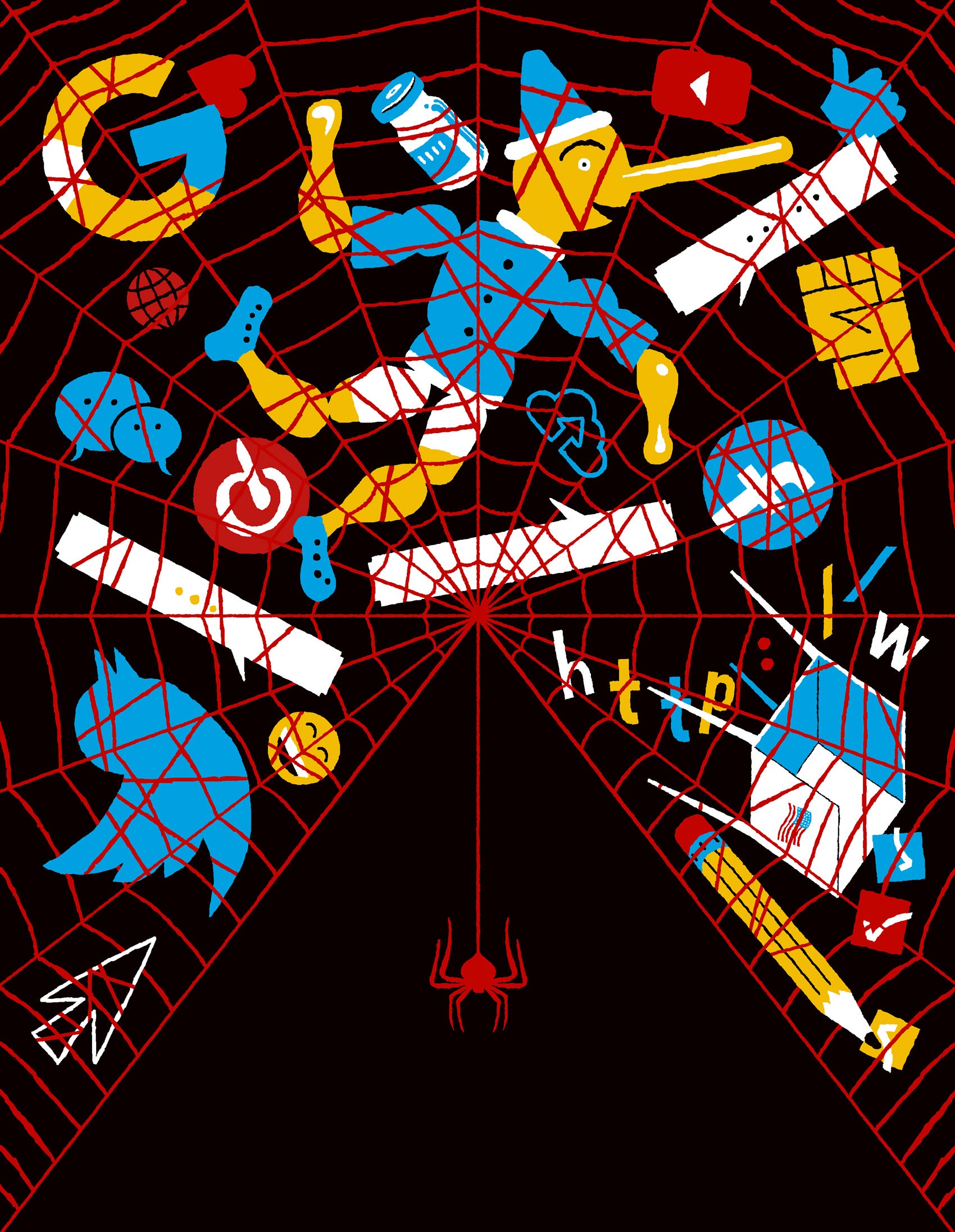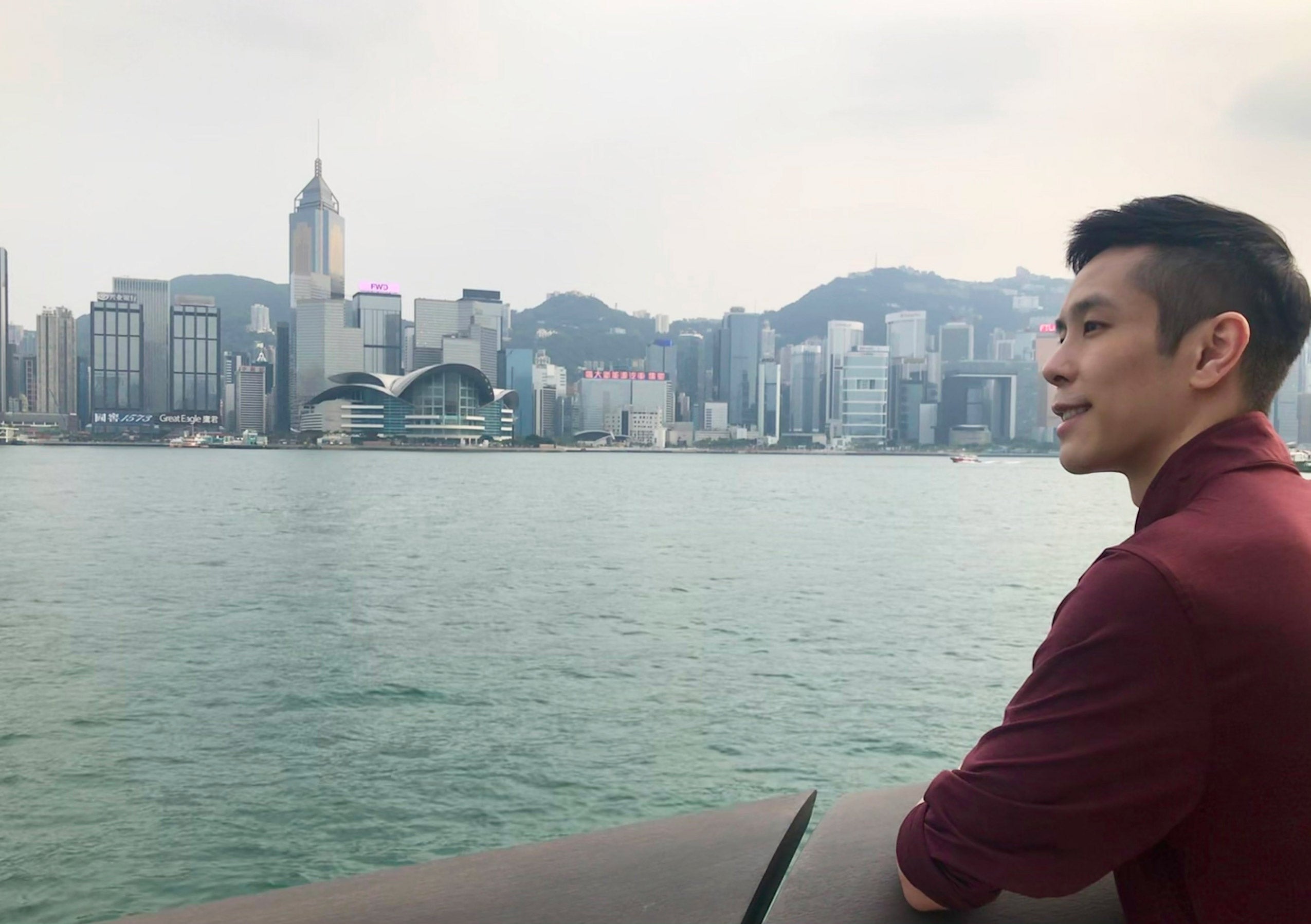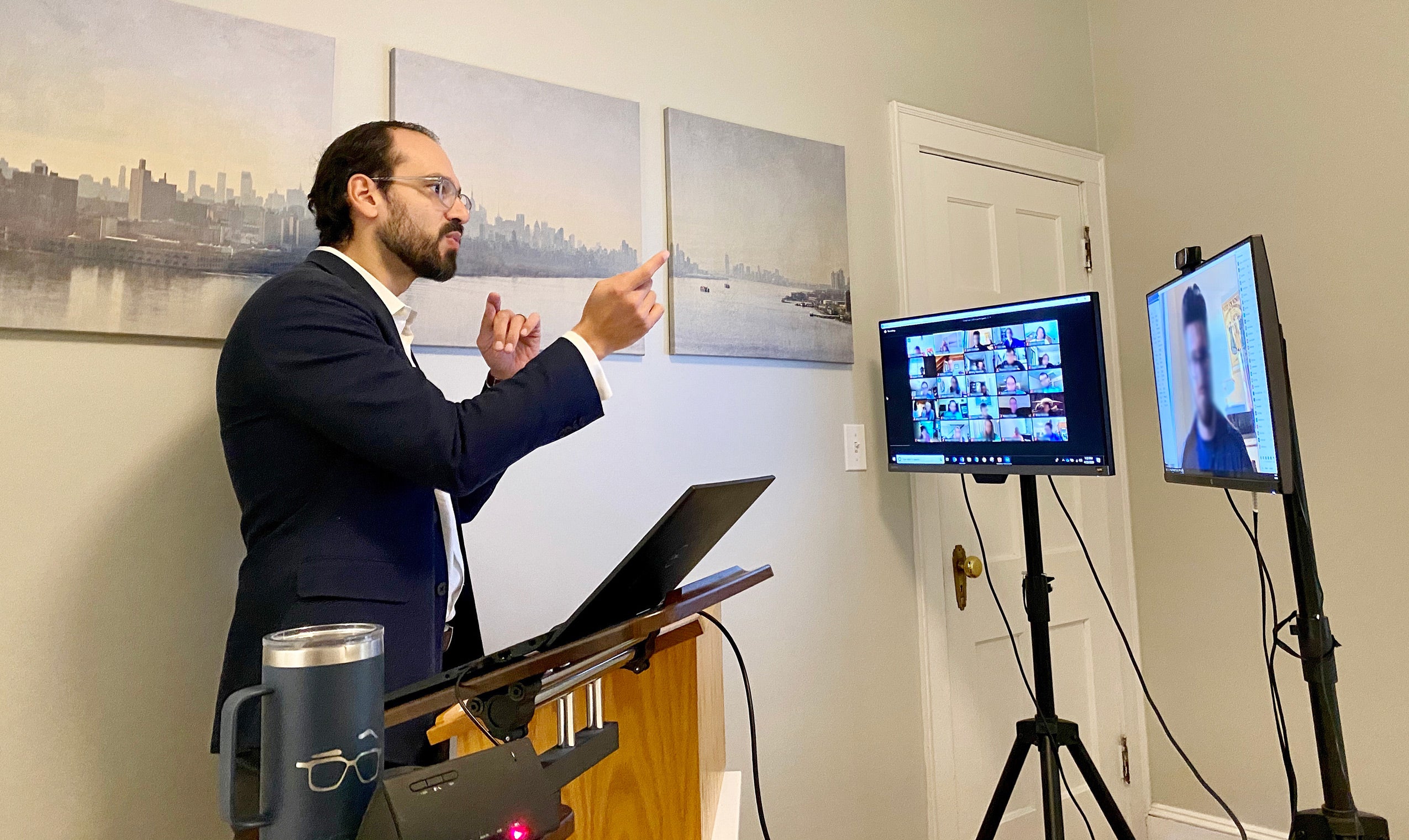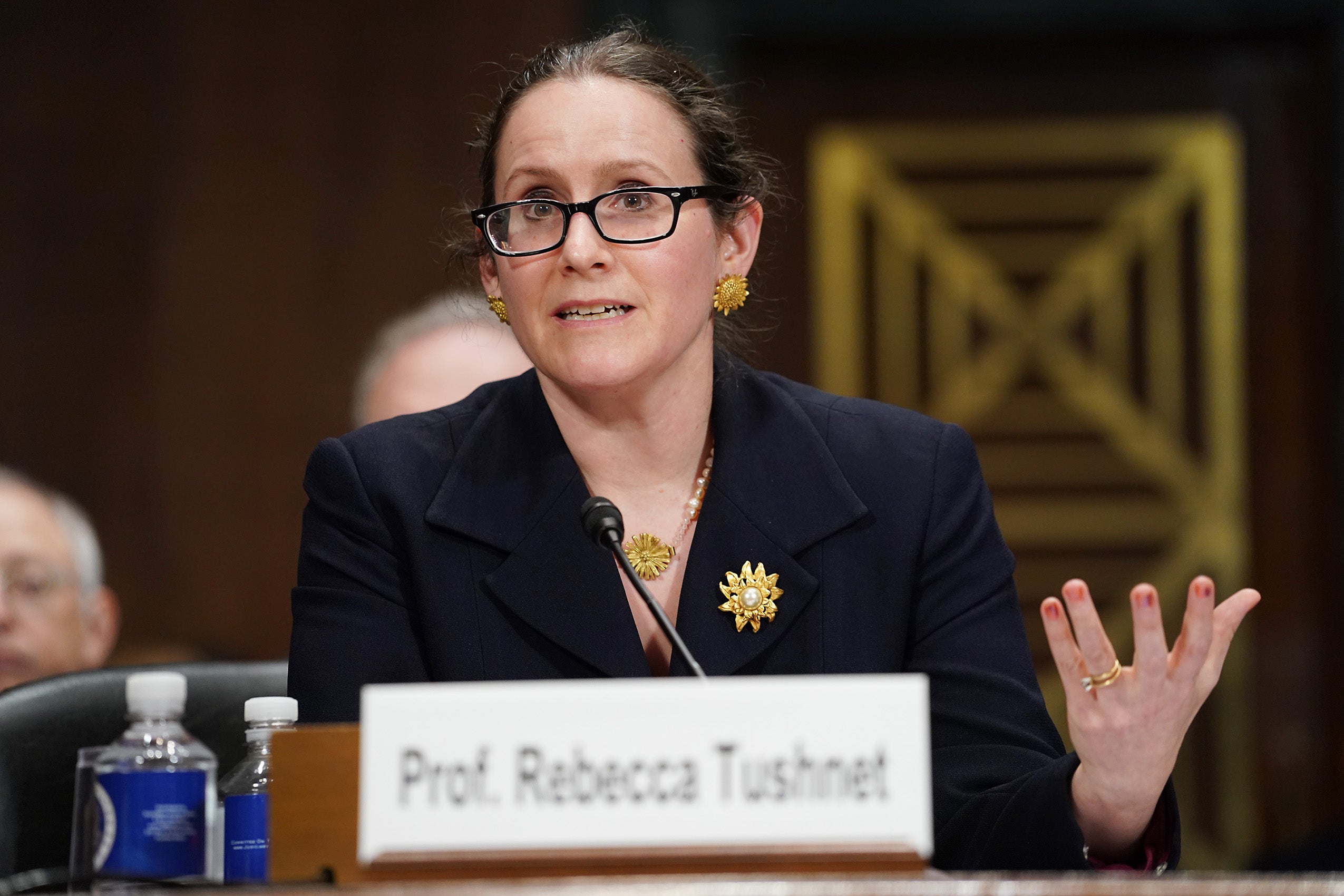People
Rebecca Tushnet
-
Digital Rights Groups Ask 11th Circ. To Nix Apple’s IP Appeal
February 17, 2022
The Electronic Frontier Foundation, a group of law professors and others on Wednesday urged the Eleventh Circuit to reject Apple's appeal of a lower court's decision that Corellium LLC's "virtual" version of the iPhone to detect potential bugs was protected by copyright's fair use doctrine. ... Several copyright professors, including Rebecca Tushnet of Harvard Law School, filed their own briefs in support of Corellium on Wednesday, saying that the "public benefits when copyright owners do not have a monopoly on information about the potential flaws in their works."
-
DC Circ. Is Told Digital Copyright Law Chills Free Speech
January 21, 2022
Advocates for the disabled, public libraries and documentary filmmakers have urged the D.C. Circuit to rule that a law making it a crime to circumvent technical features controlling access to copyrighted works violates the First Amendment. ... Copyright scholars Pamela Samuelson of the University of California, Berkeley School of Law and Rebecca Tushnet of Harvard Law School also filed an amicus brief Wednesday, arguing that the provisions "disregard and override traditional mechanisms within the Copyright Act that struck the balance between copyright protection and First Amendment interests."
-
Barbara Kruger Asks Justices To Mull Warhol Fair Use Ruling
January 12, 2022
American conceptual artist Barbara Kruger is urging the U.S. Supreme Court to look into the Second Circuit's decision that found Andy Warhol's artwork didn't make fair use of a photo of music legend Prince, saying that such works are "far from lacking creativity." ... Also on Monday, a group of copyright law professors, including Rebecca Tushnet of Harvard Law School, asked the Supreme Court to review the case. They argued that the Second Circuit wrongly disregarded the meaning of the contending works to determine why Warhol's art was transformative, which ultimately infected the court's fair use analysis. "It's [an] important fair use case for all artists, especially those without big names and deep pockets, and I believe the court will see its significance," Tushnet told Law360 by email Wednesday.
-
Inside the Realms of Ruin
October 26, 2021
“The Ruin stirs, and the Five Realms rumble,” a now-archived web announcement read on Thursday morning. “You are cordially invited to join New York Times bestselling and award-winning authors Marie Lu, Tahereh Mafi, Ransom Riggs, Adam Silvera, David Yoon, and Nicola Yoon in Realms of Ruin, a collaborative fantasy epic filled with dark magic, intrigue, and unique characters -- launched online in a thrilling new way.” ... As the catalyst for this collaborative fantasy epic, these authors would post twelve initial origin stories about their fictional universe, to which they owned the copyright. ... Within hours, fans confronted the authors in the Discord server with their concerns about the project. Rebecca Tushnet, the Frank Stanton Professor of First Amendment Law at Harvard Law School, summed the situation up aptly. “It’s a turducken of things people don’t understand,” she said. In other words, on top of the usual NFT concerns, the team would also be facing copyright questions and confronting the historical hesitancy from fan fiction writers over monetization of their works in a commercial environment.
-
Finally impressed? NFT of side-eyeing toddler meme fetches over $74,000 in cryptocurrency.
September 27, 2021
Chloe Clem did not intend to be an Internet sensation. She didn’t know her facial expression would resonate with fans for years to come. And she certainly didn’t know it would make her family more than $74,000. .... Eight years later, a non-fungible token (NFT) of the meme was sold Friday to 3F Music, a music production company based in Dubai, for 25 Ether — the cryptocurrency of the Ethereum network — which was worth more than $74,000 around the time of the sale. ... NFTs generally represent specific versions of digital files, though an NFT could also be assigned to an object, said Rebecca Tushnet, a professor of intellectual property law at Harvard Law School. “It is a way of saying, ‘I have a unique instance of a thing that is in fact infinitely replicable,’” she said. “It is basically artificially created uniqueness.”
-
Oh, what a tangled web we weave
July 7, 2021
Deception spreads faster than truth on social media. Who — if anyone — should stop it?
-
The alchemist
May 27, 2021
Keyon Lo LL.M. ’21 hopes to combine his legal and artistic skills to promote fairness and diversity
-
Memes for Sale? Making sense of NFTs
May 19, 2021
The high-priced sales of creative NFTs have recently become ubiquitous. Harvard Law Today asked intellectual property law expert Rebecca Tushnet to help make sense of the NFT boom.
-
After a 10-year legal battle, the Supreme Court ruled on Monday that Googledid not violate Oracle’s copyrights related to the Java programming language. But the momentous case that attracted briefs from many major tech companies and computer scientists may end up as a mere footnote in the history of software. That’s because the court’s opinion in favor of Google leaves intact how software developers have largely worked for decades, copying parts of existing applications that trigger functions and features and adding them to new ones...Companies including Microsoft, IBM’s Red Hat, and Mozilla filed briefs in favor of Google’s position, warning that upholding Oracle’s demands would make it much harder for new software development. “It’s a good decision for interoperability of software,” says Harvard University law professor Rebecca Tushnet, who wrote a friend of the court brief urging just such a ruling. Allowing the sharing of APIs without too much copyright protection should result in “increasing the creation and dissemination of new works.”
-
Trump social-media bans, and broader reform, overdue
January 13, 2021
Facebook, Twitter and other social-media platforms were right to at least temporarily ban President Donald Trump. The danger of Trump’s incendiary rhetoric and outright lies about election fraud was abundantly clear last week, after he goaded a mob that stormed the U.S. Capitol and interrupted the peaceful transition of power. This does not absolve platforms of their culpability, however, in amplifying, distributing and normalizing abhorrent and corrosive content for years. Nor does this let off the hook Trump’s allies and enablers, including many Republican leaders...This also will renew debate over Section 230, a telecommunications law that offers protections from liability. One intent of the law was to encourage websites to moderate objectionable content themselves, a task that the biggest platforms seem to do mostly after damage is done. Democrats have sought Section 230 changes to limit speech to which they object, while Republicans have pushed for Section 230 changes in hopes of reducing what they perceive as censorship by left-leaning tech platforms. Section 230 needs to be updated. But it’s only part of the broader regulatory reform that’s needed to address the outsized power and unfair business practices of digital platforms. Enforcing existing laws is also needed, said Rebecca Tushnet, Frank Stanton Professor of the First Amendment at Harvard Law School. She contends jailing those who carry out violent acts will do more than encouraging platforms to suspend more people.
-
Have Trump’s Lies Wrecked Free Speech?
January 6, 2021
In the closing days of his presidency, Donald Trump has demonstrated that he can make innumerable false claims and assertions that millions of Republican voters will believe and more than 150 Republican members of the House and Senate will embrace ... In the academic legal community, there are two competing schools of thought concerning how to go about restraining the proliferation of flagrant misstatements of fact in political speech ... Rebecca Tushnet, a law professor at Harvard, wrote by email: “Those are some big questions and I don’t think they have yes-or-no answers. These are not new arguments but they have new forms, and changes in both economic organization and technology make certain arguments more or differently salient than they used to be.” ... Lawrence Lessig, a law professor at Harvard...wrote by email, that “the First Amendment should be changed — not in the sense that the values the First Amendment protects should be changed, but the way in which it protects them needs to be translated in light of these new technologies/business models.” ... Randall Kennedy, who is also a law professor at Harvard, made the case in an email that new internet technologies demand major reform of the scope and interpretation of the First Amendment and he, too, argued that the need for change outweighs risks: “Is that dangerous? Yes. But stasis is dangerous too. There is no safe harbor from danger.” ... In one of the sharpest critiques I gathered, Laurence H. Tribe, emeritus professor at Harvard Law School, wrote in an email that, “We are witnessing a reissue, if not a simple rerun, of an old movie. With each new technology, from mass printing to radio and then television, from film to broadcast TV to cable and then the internet, commentators lamented that the freedoms of speech, press, and assembly enshrined in a document ratified in 1791 were ill-adapted to the brave new world and required retooling in light of changed circumstances surrounding modes of communication.”
-
Election robocalls: what we know and what we don’t
November 4, 2020
Millions of voters across the US received robocalls and texts encouraging them to stay at home on Election Day, in what experts believe were clear attempts at suppressing voter turnout in the closely contested 2020 political races. Employing such tactics to spread disinformation and sow confusion amid elections isn’t new, and it’s not yet clear whether they were used more this year than in previous elections—or what effect they actually had on turnout. However, there is some speculation that given the heavy scrutiny of election disinformation on social media in the wake of the 2016 presidential election, malicious actors may have leaned more on private forms of communication like calls, texts, and emails in this election cycle...The use of robocalls for the purpose of political speech is broadly protected in the US, under the First Amendment’s free-speech rules. But the incidents described above may violate state or federal laws concerning election intimidation and interference. That’s particularly true if the groups that orchestrated them were acting in support of a particular campaign and targeting voters likely to fall into the other camp, says Rebecca Tushnet, a law professor at Harvard Law School. The tricky part is tracking down the groups responsible, says Brad Reaves, an assistant professor in computer science at North Carolina State University and a member of the Wolfpack Security and Privacy Research Lab. The source of such calls is frequently obscured as the call switches across different telecom networks with different technical protocols.
-
These people want to trademark QAnon to cash in on novelty hats
October 6, 2020
It was bound to happen. People across the world are trying to trademark QAnon, the American far-right conspiracy theory baselessly claiming that Donald Trump is saving the world from a group of elite satanist paedophiles. According to data from the World Intellectual Property Organisation, a UN agency dealing with patents, copyrights, and trademark, seven applications to register “QAnon” or “Q Anon” as a trademark have been filed since the conspiracy theory debuted on 4Chan in October 2017. Of these, two have been successful – one in Australia and one in Germany – one has been dismissed, and the remaining four are pending. Most applications declare the intention to use the word – the pseudonym of the conspiracy theory’s initiator and now a byword for the whole delusion – as a brand for clothes, hats, coffee mugs, gadgets; some also aimed at registering the trademark to provide entertainment products and consultancy services...But the United States, where QAnon was born and most of its followers are based, is also the country where trademarking it might prove toughest. “Every time there's a cultural phenomenon, someone will try and register the associated phrase as a trademark,” says Rebecca Tushnet, a professor of law at Harvard Law School. “In the US, it usually fails.” That is because trademarks are supposed to work as indications of source: a swoosh on a pair of sneakers will tell you that those shoes were made by Nike rather than Reebok; an apple on a laptop will remind you that your computer was designed in Cupertino. In contrast, a QAnon logo on a T-shirt would not bring to mind any particular stylist. “The US Patent and Trademark Office [USPTO], which is the US entity that scrutinises these things, is likely to say: ‘This is just a name of a dispersed movement’,” Tushnet explains. “It doesn't tell anything about the source of the product.”
-
The U.S. Supreme Court seemed to struggle Monday with rules for trademarking generic names that are combined with the .com phrase. Many justices seemed to agree with an attorney for Booking.com that a 132-year-old Supreme Court precedent probably doesn’t control the case. But they also sounded wary of granting an online monopoly over entire categories of goods and services, and that it could lead to a flood of litigation over similar sounding dot.com names...A longstanding rule of trademarks is that generic names cannot be registered. The PTO argues that adding .com isn’t enough to make a generic mark descriptive and potentially eligible for registration. The agency is invoking an 1888 Supreme Court ruling, Goodyear’s India Rubber Glove Mfg. v. Goodyear Rubber, that adopted a similar rule for the addition of “Company” or “Inc.” to a name. More recently, the U.S. Court of Appeals for the Federal Circuit has upheld the PTO’s refusal to register Hotels.com and Mattress.com, and the U.S. Court of Appeals for the Ninth Circuit has found AOL’s Advertising.com generic. The agency is getting amicus support from the Electronic Frontier Foundation and a group of intellectual property scholars led by Harvard’s Rebecca Tushnet, whose brief the justices brought up repeatedly Monday. The scholars caution against giving generic mark holders too big of a stick to ward off competitors and suggest that .coms can use unfair competition law to solve the problems they’ve identified.
-
Zooming in on faculty at home
April 29, 2020
With a little help from their at-home photographers, HLS professors share what teaching classes via Zoom looks like.
-
To Tackle COVID Price Gouging, 3M Turns To Trademark Law
April 15, 2020
Price gouging on face masks during a pandemic is pretty crummy behavior, but is it a violation of federal trademark law? 3M, the country's largest producer of crucial N95 masks, certainly thinks so. The consumer goods giant filed a lawsuit Friday accusing a New Jersey company called Performance Supply LLC of violating federal trademark law by trying to resell millions of the company's N95s to New York City at drastically increased prices. Later that day, 3M filed a nearly identical lawsuit against a Utah company for similar behavior. According to 3M, both companies were selling the masks at more than four times the list price...According to Rebecca Tushnet, a professor at Harvard Law School, 3M's claim that defendants illegally held themselves out to be "authorized vendors" is something of a stretch, supported by little discussion of what separates such an endorsed distributor from a plain-old vendor. "The vendor-authorized vendor issue is a really important distinction that companies would like to ignore so that they can kill the first-sale doctrine," Tushnet said. "But first sale provides important benefits to consumers and to competition." Those concerns aside, the protections of the first-sale doctrine do have limits, and experts like Tushnet say the defendants may have crossed them by holding themselves out as actually connected to 3M. For instance, in the New York City lawsuit, 3M says the defendant company misleadingly warned the city that "acceptance of the purchase order is at the full discretion of 3M." "3M doesn't need to kill first sale," Tushnet said. "It can go after the actual falsities alleged here, and N.Y.'s attorney general is ready, willing and able to enforce the anti-price gouging statute."
-
Oracle and Google are about to face off in tech’s trial of the century
February 18, 2020
On March 24, the Supreme Court is scheduled to hear one of the most momentous tech cases in decades...The case is Google v. Oracle, and it turns on who owns scraps of computer code known as APIs. Short for application programming interfaces, APIs allow one computer program to talk to another by letting, for instance, a weather app pull live temperatures from a third party and then display them on a map. APIs are an essential building block of the digital economy, and in the blockbuster case Oracle says Google committed copyright infringement by using its APIs without permission...A final wild card in the case is the fact that the aged members of the Supreme Court are unlikely to have deep knowledge of APIs. Harvard law professor Rebecca Tushnet, who filed a brief supporting Google and its fair-use argument, believes the justices will get up to speed when the case goes to trial. Nonetheless, she acknowledges there is a risk they may overlook the technical intricacies of the case—including that Google is claiming only a specific subset of APIs shouldn’t be copyrighted. If this happens, the justices may rely instead on the broader story lines that the companies are arguing. “A compelling narrative always matters. It gives the court a reason to find in your favor,” says Tushnet. “One framing of the story is that Google went ahead and plundered. The other framing is Oracle took something that belongs to everyone else.”
-
Rebecca Tushnet testifies on the Digital Millennium Copyright Act
February 16, 2020
Rebecca Tushnet, the inaugural Frank Stanton Professor of the First Amendment and a director of the Berkman Klein Center for Internet and Society, testified before the U.S. Senate Judiciary's Subcommittee on Intellectual Property, on Feb. 11, on “The Digital Millennium Copyright Act at 22: What is it, why was it enacted, and where are we now?”
-
Senate IP Subcommittee Kicks Off Year-Long Review of Digital Millennium Copyright Act
February 14, 2020
Senator Thom Tillis (R-NC) and Senator Chris Coons (D-DE) this week held the first in a series of eight tentative hearings scheduled for this year on the topic of updating and modernizing the U.S. Digital Millennium Copyright Act. Tillis’ goal is to address changes to the internet since the DMCA was passed in 1998, and by December 2020 to release draft text of a reform bill for stakeholder comment... Professor Rebecca Tushnet of Harvard Law School and Professor Jessica Litman of University of Michigan Law School strongly cautioned the Subcommittee against conflating all internet service providers with Google and Facebook. “Only a few services receive millions of [takedown] notices,” Tushnet said. “Most don’t need and couldn’t survive a requirement to use technological mechanisms to filter out rare infringements. If Congress changes 512 to target Google and Facebook, it will ensure that only they are left, making the problem of market concentration even worse.”
-
Copyright could be the next way for Congress to take on Big Tech
February 14, 2020
The first of 2020’s big copyright hearings started with a nod to Chumbawamba. Senator Thom Tillis (R-NC) had looked up which band topped the charts in 1998, the year Congress passed the Digital Millennium Copyright Act — one of the most influential and controversial laws governing the internet. Then, Tillis paused soberly. “I don’t know if we’re talking a lot about Chumbawamba” these days, he said. And the DMCA itself? “Almost every single thing about the internet has changed over the past 22 years, and the law simply hasn’t kept pace.”...The 1998 DMCA attempted to outline how copyright should work on the then-nascent internet, where you could almost freely and infinitely copy a piece of media. But it’s been widely criticized by people with very different stances on intellectual property. Supporters of tougher anti-piracy rules, for instance, argue that its “safe harbor” rules don’t motivate websites to keep pirated content offline. Conversely, internet freedom advocates say its takedown system provides a de facto censorship system for the web. And the DMCA’s reach touches far-flung issues like farm equipment repair, which makes it unavoidable even for industries with no piracy problems. This week’s hearing focused on two pieces of the law: Section 512, which spells out platforms’ liability for pirated content, and Section 1201, which limits cracking digital copy protection. “Most service providers don’t need and can’t get expensive filtering technology” that they’d need to implement a “stay-down” system, said Harvard Law School professor Rebecca Tushnet. “If Congress changes the DMCA to target Google and Facebook, or because of rogue overseas sites that already aren’t complying with the DMCA to begin with, it will ensure that only Facebook, Google and pirate sites survive.”
-
GOP Sen. Eyes Update To Decades-Old Cyber Copyright Law
February 12, 2020
Sen. Thom Tillis, R-N.C., said Tuesday that landmark legislation passed in 1998 to protect innovation and free speech on the internet while still fighting copyright infringement needs to be updated and that he wants to craft a reform bill by the end of the year. Tillis, who chairs the Senate Judiciary Committee’s intellectual property panel, kick-started the process of updating the Digital Millennium Copyright Act by convening a hearing with experts who talked about the pros and cons of the law as it operates today...There has been an exploding number of take-down notices under the law’s safe harbors, known as Section 512, he said....But Rebecca Tushnet, a First Amendment professor at Harvard Law School, opposed making the kinds of changes sought by those two witnesses, saying that even though “the system is by no means perfect ... like democracy, it's better than most of the alternatives that have been tried.” “Changes to 512 would be likely to make things much worse,” she said. Tushnet recommended, among other things, focusing on antitrust in copyright and telecom in any reform of the 1998 law.




